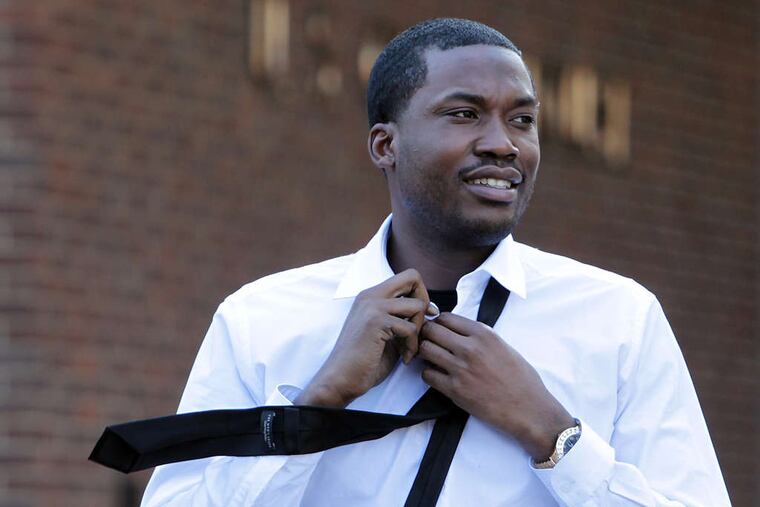Appeals court grants Meek Mill a new hearing
Philadelphia-born rapper Meek Mill was granted an appellate hearing in Pennsylvania Superior Court to argue that his drug and gun conviction should be overturned.

The Philadelphia-born rapper Meek Mill moved a step closer to closing the books on the criminal case in which he’s been entangled for more than a decade on Tuesday, when Superior Court granted him a hearing to argue that his drug-and-gun conviction should be overturned.
The July 16 hearing will give the rapper’s lawyers the opportunity to present their case to a panel. Common Pleas Court Judge Genece E. Brinkley has jailed Mill several times for parole violations, prompting his legal team to accuse her of bias.
The court’s decision to hear the entertainer comes two weeks after District Attorney Larry Krasner’s office — for the first time in legal briefs — stated that it believes Brinkley has been biased against Mill, abused her discretion when she sentenced him to prison in 2017 for probation violations, and should be removed from ruling in his ongoing appeals.
Mill was convicted on gun and drug charges in 2008. After being paroled following a short prison sentence, he was on probation except for several times when Brinkley jailed him for probation violations, the last being in November 2017, when she sentenced him to two to four years in prison. The Pennsylvania Supreme Court freed Mill on bail in April 2018 for the duration of his appeals.
Jordan Siev, one of Mill’s attorneys, said that besides seeking to overturn Brinkley’s 2017 ruling returning him to jail and her June 2018 order denying him a new trial, the rapper wants the appellate court to transfer his case to another judge.
The rapper’s attorneys believe that he was framed by former Philadelphia Police Officer Reginald Graham, who arrested him. Graham, the only witness to testify at the 2008 nonjury trial, claimed that Mill had pointed a gun at him while he was trying to arrest the then-19-year-old for selling drugs in Southwest Philadelphia. But recently, two other officers have come forward with sworn affidavits claiming that Graham lied.
Graham — who retired from the force in 2017 and has never been charged with a crime — was identified in February 2018 by The Inquirer as one of two dozen officers on a secret list compiled by the District Attorney’s Office of cops with credibility problems. He was accused of stealing drug bust money, lying to the FBI about it, and failing an FBI polygraph test.
“We’ve always felt very strongly about our legal position that you can’t have a conviction stand where the only witness is a police officer who the prior District Attorney’s Office deemed not believable and put on a list of witnesses who could not be called to testify,” Siev said. “We feel this conviction should have been overturned a long time ago.”
Despite the revelations about Graham and the District Attorney’s Office’s last year saying it believed Mill was entitled to a new trial, Brinkley was not convinced.
“We’ve always said that we don’t want Meek to be treated differently than anyone else, we want him to be treated the same. The same treatment here calls for a new trial,” Siev said. “We are cautiously optimistic going into this hearing that Meek will finally be free and this injustice will be righted.”